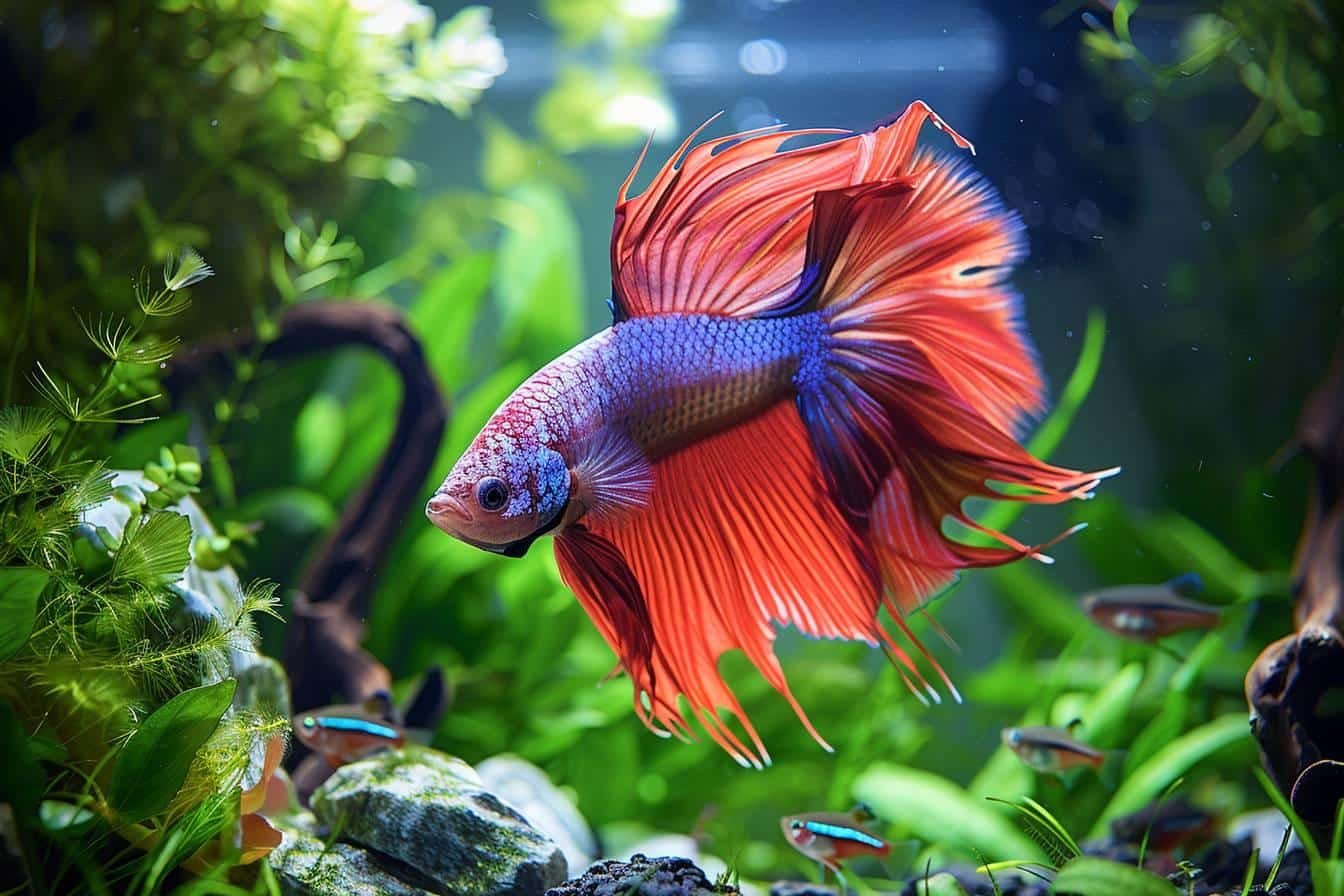Le betta fishalso known as the Siamese Fighter, is a little aquatic jewel that has fascinated aquarium enthusiasts for decades. With its bright colours and strong personality, this ornamental fish has won the hearts of many enthusiasts. Let's delve into the fascinating world of this little warrior-like swimmer.
Origins and characteristics of betta fish
Native to the fresh waters of Southeast Asia, the betta fish has adapted to a variety of aquatic environments. It is found naturally in the rice paddies, streams and marshes of Thailand, Cambodia, Vietnam, Laos, Malaysia and Indonesia. These shallow habitats have shaped its evolution, giving it unique characteristics.
The betta fish is modest in size, ranging from 4 to 7 cm when fully grown. Its average lifespan in captivity is 2 to 6 years, but in optimal conditions, some specimens can reach the venerable age of 10 years. I was personally lucky enough to observe a betta that lived to be 8 years old in our pet shop, which is still exceptional!
An exciting feature of the betta is its labyrinthine organ, which allows it to breathe air at the surface in addition to its gills. This adaptation gives it greater resistance to poorly oxygenated water. Be careful, though, as this ability to breathe out of the water can also cause it to jump out of the aquarium if it is not properly covered!
Sexual dimorphism and varieties
Sexual dimorphism in bettas is particularly marked. Males have brighter colours and more developed fins than females. This difference is the reason for their popularity in the aquarium trade. Over the years, breeders have selected numerous varieties, offering an impressive range of colours and fin shapes.
Behaviour and personality
The betta fish is renowned for its territorial temperament and bellicoseThis aggressiveness has earned it the nickname "fighting fish". This aggressiveness has earned it the nickname of "fighting fish". But make no mistake: behind this warlike facade lies an intelligent fish capable of recognising its owner. I was often surprised to see our bettas react to my presence when I approached their aquarium!
Special reproduction
The reproduction of bettas is a fascinating spectacle. The male builds a nest of bubbles on the surface of the water, where he lays the eggs after mating. He then watches over his offspring jealously, providing fierce protection against any intruder.
Maintenance of betta fish in aquariums
To provide your betta with the best possible habitat, there are a few basic rules to follow. Here is a table summarising the ideal parameters for your aquarium:
| Parameter | Recommended value |
|---|---|
| Minimum volume | 15-20 litres |
| Temperature | 24-28°C |
| pH | 6,0-7,5 |
| Hardness | 3-12 GH |
As a pet shop floor manager, I can only recommend that you pay particular attention to water quality. Regular water changes (around 25% per week) are essential to maintain a healthy environment. Gentle filtration is also recommended, as bettas don't like strong currents.
Aquarium layout
For your betta's well-being, think about furnishing its space with natural or artificial plants and hiding places. These will help it to feel secure and reproduce its natural behaviour. Floating plants are particularly popular, as they provide shade and support for the bubble nest.
Suitable food
The betta fish is a carnivore that loves insects and larvae. In captivity, a varied and balanced diet is crucial to its health. Here are some recommended options:
- Specific food for bettas (granules or flakes)
- Frozen mosquito larvae
- Artemia
- Daphnia
Be careful not to overfeed! Two or three meals a day in small quantities are more than enough. In my experience, a well-fed betta is a happy betta!
Cohabitation and socialisation
Cohabiting with other species can be tricky. Because of its territorial nature, it is best to keep it alone in a special aquarium. If you still want to try to get them to live together, opt for peaceful species and avoid at all costs fish with colourful fins, which could be perceived as rivals.

Care and attention
Taking care of a betta fish requires a certain amount of vigilance. As a keen aquarist, I can only encourage you to keep a close eye on the health of your little protégé. The main points to watch out for are :
- Water quality: test the parameters regularly to avoid any imbalance.
- Diet: vary your meals and avoid overeating.
- Potential illnesses: check your betta daily for any abnormal behaviour or signs of illness.
Don't hesitate to consult a specialist vet if in doubt. Prevention is better than cure, as we say in the trade!
The price of a betta can vary considerably, from €5 to €50 depending on the variety. The rarest specimens with the most spectacular colours can fetch substantial sums. But remember that price isn't everything: a cheaper betta can be just as endearing and full of personality!
Ultimately, the betta fish is much more than just an aquatic ornament. It's a true companion that will surprise you with its intelligence and unique personality. With the right care and attention, you can enjoy the company of this colourful little warrior for many years to come. So, ready to dive into the betta adventure?
External sources :
